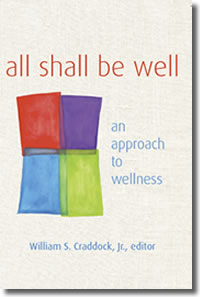All Shall Be Well
A book, a conversation and an invitation to the explorefaith audience
A History of CREDO and the Meaning of Wellness
Christian faith values equally all facets of human life and experience. Physical wellness and activity are not “inferior” to intellectual or aesthetic qualities. It is in the balance, unity, and harmony of the entire person (or community) that true wellness emerges. For Christians,the ultimate goal of life is, through Christ, to be restored to complete unity with God—a harmony in which all the fragmentation and division that cause self-alienation and separates people from one another is finally overcome.
-- Robert R. Hansel
Who among us does not want to be well? Who would not pay to have their aches and pains disappear, their illnesses healed, their anxieties wiped away leaving no trace of worry. And who has not experienced disappointment as one solution after another reneged on its promise, and wellness remained beyond our grasp.
Yet, for Christians it's clear that wellness is part of God's intention. Jesus healed both body and soul. And Christ's message is one of transforming lives. Perhaps, the problem with achieving wellness lies in our focus, how we define it, and where we look for healing.
Over the past 12 years, an organization called CREDO has held eight-day retreats to help participants come to a new understanding of wellness that is rooted in the reign of God and in union with Christ. Conference members practice self-reflection and renewal around the issues of
Identity - Who am I?
Discernment – Who is God calling me to be?
Practice – How am I responding to God’s call?
Transformation – How am I changing?
From the retreats has come a book organized around those four key areas of spiritual inquiry comprising essays from CREDO conference faculty members and researchers: All Shall Be Well: An Approach to Wellness, with CREDO Managing Director William S. Craddock, Jr. serving as editor.
The intention is to spread these ideas into churches and communities, cultivating new thinking about wellness and spiritual peace.
It’s a book that captures the heart of the CREDO conference experience. But more than a conference overview, All Shall Be Well underscores a progressive cycle of personal and vocational discernment that can enhance wellness and offers clarity at a time of challenge and change.
In addition, from mid-November to mid-January, CREDO is hosting a two-month conversation based on chapters from All Shall Be Well. The online discussion—like the book—follows the four themes of Identity, Discernment, Practice, and Transformation.
Transformation, the theme of the two-week discussion from January 1-15, focuses on the essays “The Alchemy of Effort and Grace” by Brian Taylor and "Fitness for God’s Mission” by Mark Hollingsworth.
William Craddock, Jr., editor of All Shall Be Well, writes: “Managing change is a constant challenge and directly informs, reforms, and perhaps transforms our sense of identity. You may be familiar with the old saying that change is inevitable but choice is always an option. The essays in this chapter explore various perspectives of change and the choices we can make to manage our lives and live into a greater sense of wholeness and well-being."
You are invited to read the two chapters on transformation, and join the authors in this discussion.
To engage in the online conversation on wellness and the book All Shall Be Well, go to the CREDO Institute Web site or directly to the conversation at http://asbw.wordpress.com. More information about the book and selected chapters can be downloaded there.
Each two weeks new chapters have become available and new conversations opened. The complete schedule being:
November 15-30 Identity
“Values to Live By” by the Rev. Dr. Robert R. Hansel
“Toward a Theology of Wellness” by the Rt. Rev. Jeffrey D. Lee
December 1-15 Discernment
“A Life of Discernment” by the Rev. Canon M. Renée Miller
December 15-31 Practice
“Practicing a Life of Prayer” by the Rev. Dr. Sam Portaro
“Emotional Well-Being: Finding Joy that Is Complete” by the Rev. Joseph A. Stewart-Sicking
“Permanent Wealth: You CAN take it with You!” by Phyllis T. Strupp
January 1-15, 2010 Transformation
“The Alchemy of Effort and Grace” by the Rev. Brian C. Taylor
“Fitness for God’s Mission” by the Rt. Rev. Mark Hollingsworth, Jr
As Robert Hansel wrote: "Lasting wellness and personal peace come only from the integration of all aspects of one’s life. In the end, of course, such renewal is the work of God alone. Our privilege is to offer resources, support, and assistance and then to get out of the Spirit’s way."
Our explorefaith audience has been especially invited to join in the effort to offer these resources and support. Read the All Shall Be Well online chapters, offer your thoughts in the wellness conversation, and participate in this endeavor to realize the wellness that we all hope to have.
Help explorefaith when you purchase ALL SHALL BE WELL or any other item from Church Publishing, Inc., our Partner in Ministry.
Also available at amazon.com.